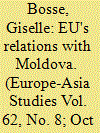| Srl | Item |
| 1 |
ID:
090086


|
|
|
|
|
| Publication |
2009.
|
| Summary/Abstract |
Since the end of the Cold War, European Union (EU) efforts in transforming Central and Eastern Europe (CEE) have been enormously successful. The 2004 enlargement is widely regarded as the single most effective foreign policy strategy in the Union's history, and the recent European Neighbourhood Policy (ENP) was designed to repeat that success in countries located on the EU's new Eastern borders. Although the ENP has been the subject of substantive discussion in European academia, Belarus is the one country in Eastern Europe that has largely escaped scholarly attention. This article takes stock of recent developments in EU-Belarus relations and seeks to explain the very limited leverage of the EU over the country. We first examine the EU's relations with Belarus through the theoretical lens of external governance. By taking for granted the EU's ability to transfer its norms and values, however, the governance perspective does not account for the EU's very limited success in changing Belarus. We therefore revisit Michael Smith's notion of `boundaries of order' to highlight the impact of legal/institutional, transactional, cultural and geopolitical factors on EU-Belarus relations. We argue, in particular, that the existence and the construction of boundaries between the Union and its neighbouring states are essentially mutually constitutive processes. Besides shifting its own boundaries (and thereby extending its rules to outsiders), the EU is itself subject to the boundaries enacted by neighbouring states. In our conclusion, we juxtapose the notion of external governance as `rule transfer' with `partnership' as a more suitable mode of interaction between the EU and Belarus.
|
|
|
|
|
|
|
|
|
|
|
|
|
|
|
|
| 2 |
ID:
106739


|
|
|
|
|
| Publication |
2011.
|
| Summary/Abstract |
The article examines the EU's and specifically the European Commission's proposals for an external energy policy. The analysis departs from the assumption that the geographical scope of the Commission's proposals is not the result of 'geopolitical facts' but rather of a discursive policy process of geopolitical writing in which geopolitical images and ideas are constantly being created and re-created. I first examine how the Commission is constructing its vision of an integrated European energy space in theory and how it uses 'spectacular' images to justify the linkages between energy security and geography. I then distinguish between Walters's notions of 'networked' and 'colonial' type of relations between the EU and third states to examine the wider political purpose behind the Commission's vision of the European energy space. I then analyse the extent to which the Commission's geopolitical vision has been or can be implemented in practice in four concrete empirical case studies: EU energy relations with Eastern Europe, the Mediterranean/Middle East, the Caucasus and the Russian Federation.
|
|
|
|
|
|
|
|
|
|
|
|
|
|
|
|
| 3 |
ID:
099503


|
|
|
|
|
| Publication |
2010.
|
| Summary/Abstract |
This article examines recent EU-Moldova relations under the European Neighbourhood Policy (ENP) and the Eastern Partnership (EaP) in order to assess the EU's policies and their (limited) effectiveness over the past decade. I draw on the 'external governance approach' and develop the 'partnership as cooperation perspective' to examine which approach prevails in the theory and in the political practice of EU-Moldova relations. Whereas the external governance approach focuses on the expansion of EU rules to assess the effectiveness of the EU's external relations, the partnership perspective draws attention to effective cooperation based on mutual concessions in areas of converging preferences.
|
|
|
|
|
|
|
|
|
|
|
|
|
|
|
|
| 4 |
ID:
106737


|
|
|
| 5 |
ID:
184712


|
|
|
|
|
| Summary/Abstract |
In bilateral relations and negotiations with the European Union (EU), smaller and economically weaker states are often unable to express their national preferences. Despite their limited bargaining power, however, some Eastern Partnership (EaP) countries obtained significant concessions from the EU. This article analyzes the factors that explain EaP states’ unexpected negotiation success in the context of the Deep and Comprehensive Free Trade Agreement (DCFTA) with Ukraine, the Comprehensive and Enhanced Partnership Agreement (CEPA) with Armenia, and enhanced economic partnership with Belarus. We identify negotiation strategies that are crucial to understanding of the puzzle.
|
|
|
|
|
|
|
|
|
|
|
|
|
|
|
|
| 6 |
ID:
186561


|
|
|
|
|
| Summary/Abstract |
Following Russia’s invasion of Ukraine, the EU has taken dozens of decisions, on which agreement had hitherto been unthinkable due to differences between member states. A norms-based approach is used to better understand the EU’s unexpected agreement on two key measures: the sanctions packages against Russia and the decision to allow Ukrainian nationals the right to live and work in the EU. Congruence among member states over the responsibility to protect Ukrainian civilians from atrocity crimes and war crimes played an important role, including the obligations to react (sanctions) and to prevent (refugee protection). EU actions arising from moral obligations based on rights-based norms have been linked closely to values-based norms pertaining to EU solidarity, identity, and ethical obligations vis-à-vis fellow Europeans. These preliminary findings matter as they suggest an inextricable linkage between rights-based norms and values-based norms to trigger effects on EU foreign policy.
|
|
|
|
|
|
|
|
|
|
|
|
|
|
|
|